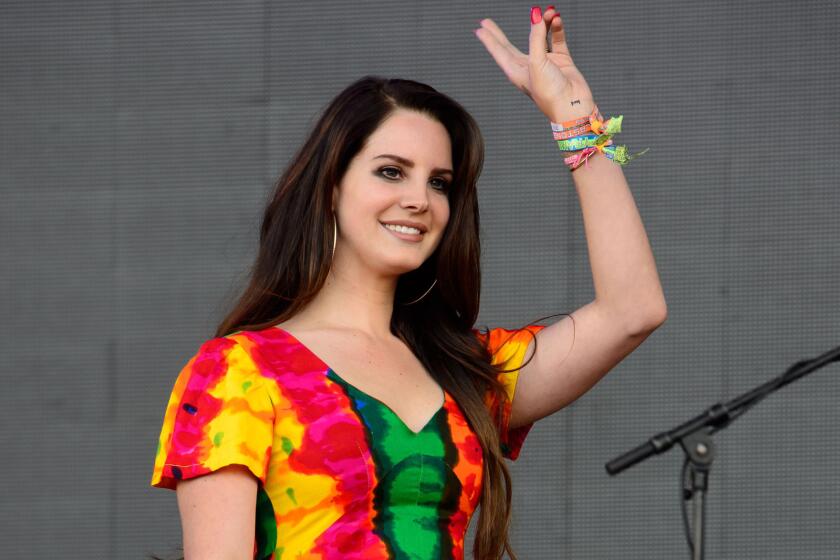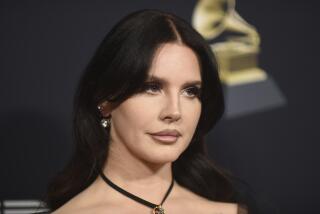Lana Del Rey slammed for dissing Beyoncé and other female artists of color

- Share via
Lana Del Rey is once again critiquing her critics, and this time she’s dragging other female artists into the fray.
In a lengthy Instagram post name-checking Beyoncé, Ariana Grande and Camila Cabello, among others, the “Norman F—ing Rockwell” singer hit back at people who say she’s “glamorizing abuse” in her music. (She also announced the release date of her new album: Sept. 5.)
“Question for the culture,” Del Rey wrote on Thursday. “Now that Doja Cat, Ariana, Camila, Cardi B, Kehlani and Nicki Minaj and Beyoncé have had number ones with songs about being sexy, wearing no clothes, [having sex], cheating, etc — can I please go back to singing about being embodied, feeling beautiful by being in love even if the relationship is not perfect, or dancing for money — or whatever i want — without being crucified or saying that I’m glamorizing abuse???????”
While many fans praised Del Rey for speaking her mind, several others criticized her for appearing to judge other women — mostly women of color — for their success.
“So what we’re not gonna do is demonize black female artists for singing about sex and the realities of their love lives,” one person commented. “I get what you’re saying, but you didn’t have name drop and disrespect a bunch of black women.”
“You have no right to rain on anyones parade and try to discredit their successes,” wrote another. “No matter what they chose to write about the song went number one for a reason :) dont be a sore loser.”

Others wondered why Del Rey’s missive failed to mention prominent white artists, such as Billie Eilish, Taylor Swift, Lady Gaga and Katy Perry, and noted that the women she mentioned haven’t exactly had it easy in the music industry.
Earlier this month, cookbook author Alison Roman faced similar backlash for insulting two women of color with booming lifestyle businesses: celebrity chef Chrissy Teigen and “The Life-Changing Magic of Tidying Up” organizer Marie Kondo.
Roman later apologized for her remarks, acknowledging her privilege as a white woman, but her cooking column for the New York Times is now on “temporary leave.”
A representative for Del Rey did not immediately respond to the Los Angeles Times’ request for comment.
Cookbook author Alison Roman’s popular New York Times food column is on “temporary leave” after Roman’s criticisms of Chrissy Teigen and Marie Kondo.
Later in her statement, Del Rey explained that her songs are based on her personal experiences navigating “challenging relationships.” The pop star has a reputation for exploring dark themes, such as domestic violence and depression, in her music, including on last year’s Grammy-nominated “Norman F—ing Rockwell.”
She also has a reputation for sparring with music critics with whom she disagrees, most notably NPR’s Ann Powers.
“I’m fed up with female writers and alt singers saying that I glamorize abuse when in reality I’m just a glamorous person singing about the realities of what we are all now seeing are very prevalent abusive relationships all over the world,” she continued.
“With all of the topics women are finally allowed to explore I just want to say over the last ten years I think it’s pathetic that my minor lyrical exploration detailing my sometimes submissive or passive roles in my relationships has often made people say I’ve set women back hundreds of years.”
Comparing herself again to her industry peers, Del Rey also claimed she continues to receive unfair treatment in the press for singing her complex truth, while she believes others can now express themselves more freely because she “paved the way” for them.
A funny thing happened when Lana Del Rey fans attacked critic Ann Powers; critics slapped back.
“Let this be clear, I’m not not a feminist – but there has to be a place in feminism for women who look and act like me,” she said. “The kind of women who are slated mercilessly for being their authentic, delicate selves, the kind of women who get their own stories and voices taken away from them by stronger women or by men who hate women.
“I’ve been honest and optimistic about the challenging relationships I’ve had. ... I feel it really paved the way for other women to stop ‘putting on a happy face’ and to just be able to say whatever the hell they wanted in their music — unlike my experience where if I even expressed a note of sadness in my first two records I was deemed literally hysterical as though it was literally the 1920s.”
More to Read
The biggest entertainment stories
Get our big stories about Hollywood, film, television, music, arts, culture and more right in your inbox as soon as they publish.
You may occasionally receive promotional content from the Los Angeles Times.











